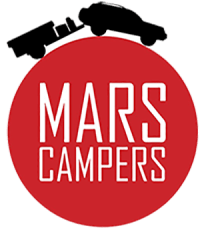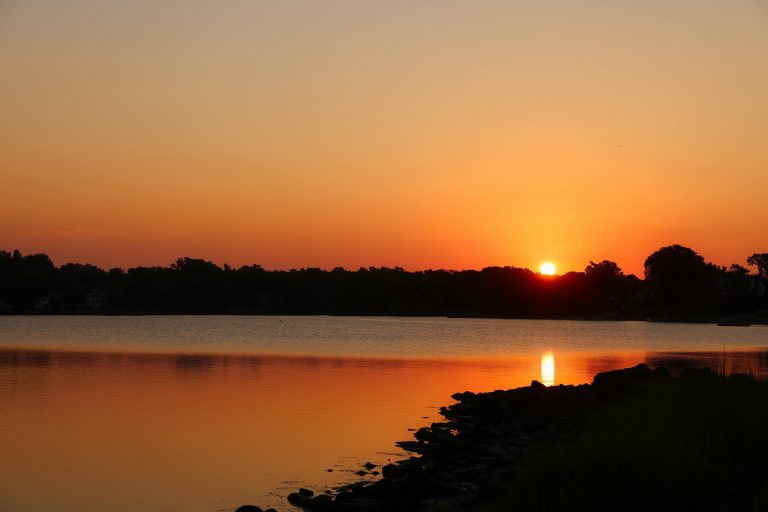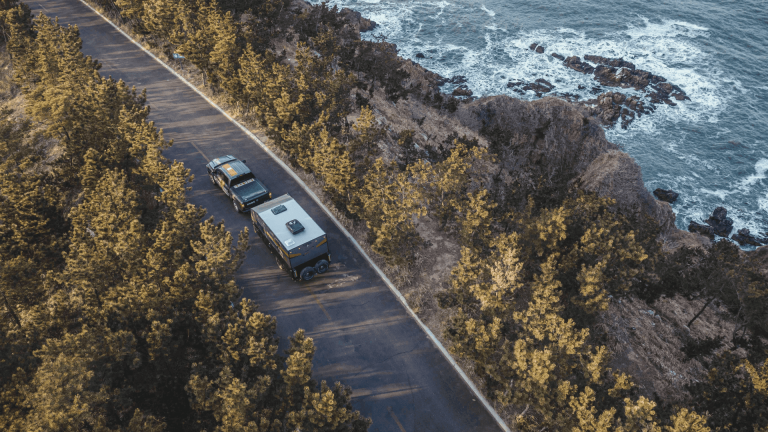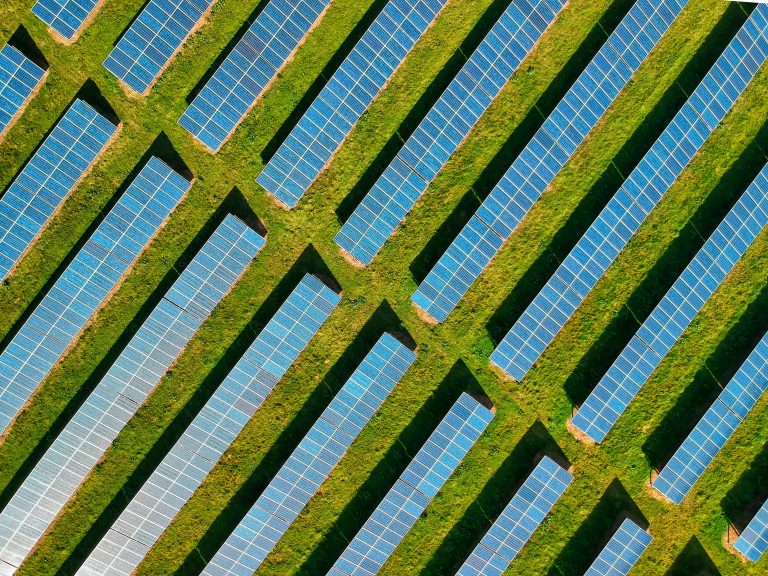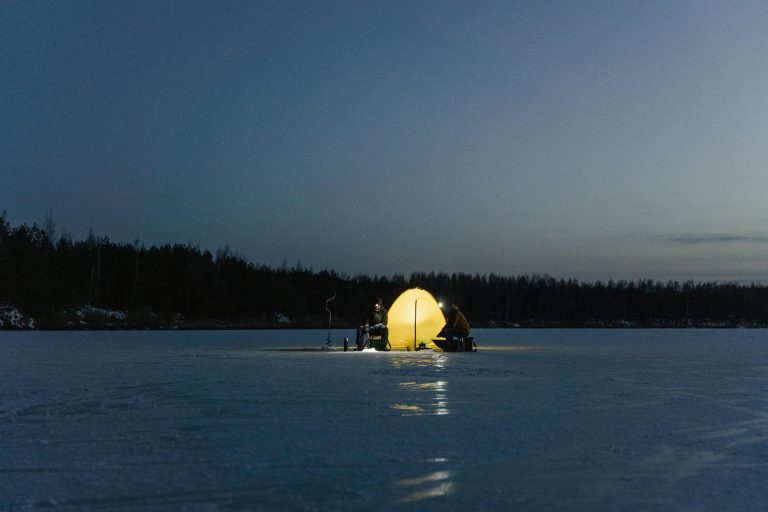Table of Contents
Have you ever dreamed of hitting the open road without sacrificing your comfort? A camping camper trailer might be your ticket to adventure. I remember my first trailer purchase—equal parts exciting and overwhelming. But don’t worry! This guide will walk you through everything I wish someone had told me before I jumped into the wonderful world of camper ownership.
Why Choose a Camper Trailer Over Tents?
Let’s be real—tents have their charm—the connection with nature, the simplicity, the tradition. But after a long day of hiking, returning to a real bed instead of a sleeping bag on the ground? Absolute game-changer.
Camping camper trailers offer the perfect compromise between roughing it and bringing your entire house along. You get protection from the elements, actual cooking facilities, and—my personal favorite—a bathroom that isn’t shared with hundreds of other campers.
And convenience? Oh boy. No more spending hours setting up and tearing down camp. Most trailers take 15-30 minutes to set up, leaving more time for what you came for—enjoying the outdoors!
But the biggest advantage might be the extended camping season. While tent campers pack it in when temperatures drop, trailer owners can comfortably camp well into fall or start earlier in spring. Those shoulder seasons often offer the most beautiful camping experiences with fewer crowds.
Why do families switch from tents to trailers as kids get older? It’s not just about comfort—it’s about sanity! Having separate sleeping areas and storage for all that gear makes family trips feel like vacations rather than endurance tests.
What Nobody Tells You About Trailer Maintenance
Here’s the truth that glossy brochures won’t tell you: your camper trailer requires regular maintenance. Skip this, and you’ll pay later—trust me, I learned the hard way!
First up: water is both your friend and enemy. You need it for showers and dishes, but moisture in the wrong places can destroy your trailer from the inside out. Check seals and seams at least twice a year. Look for discoloration on ceilings and walls—early signs of water damage that’s much cheaper to fix early.
Battery maintenance surprises most newbies. Even when your trailer is in storage, its batteries need attention. A disconnected or dead battery can lead to system issues down the road.
So here’s my maintenance crash course:
🔧 Monthly Checks:
- Test battery levels and connections
- Inspect tire pressure and condition
- Check all seals for cracks or separation
⚠️ Seasonal Musts:
- Lubricate moving parts (stabilizers, steps, door hinges)
- Clean and treat the roof according to the manufacturer’s specs
- Sanitize the water system before first use each season
✅ Annual Professional Service:
- Wheel bearing inspection
- Propane system safety check
- Brake controller and electrical system test
Pro Tip: Create a maintenance calendar with reminders on your phone. It’s easy to forget these tasks until you’re already at the campground with a problem!
The toilet system deserves special mention. Use proper RV toilet paper and treatment chemicals—regular household products can cause expensive blockages. And learn how to properly winterize your water system if you live where temperatures drop below freezing.
5 Must-Check Features Before Buying
Shopping for your first camping camper trailer should be fun, not overwhelming. Focus on these five critical features that will make or break your camping experience:
1. Weight Capacity and Towing Compatibility
Know your vehicle’s towing capacity before falling in love with any trailer. This is non-negotiable. Your SUV or truck has specific limits, and exceeding them isn’t just illegal—it’s dangerous.
Got kids? Look for a trailer that’s 20% under your vehicle’s maximum towing capacity. This gives you a safety margin for gear, water, and those “must-have” purchases you’ll inevitably make.
Most midsize SUVs handle trailers in the 3,500-4,500 pound range, while half-ton trucks typically manage 5,000-7,000 pounds. But don’t just go by the “dry weight”—look at the Gross Vehicle Weight Rating (GVWR), which includes everything you’ll pack.
2. Floor Plan Functionality
The layout matters more than the overall size. A well-designed 18-foot trailer can feel more spacious than a poorly designed 22-foot model.
For couples or solo travelers, consider these efficient layouts:
- Front queen bed with rear kitchen
- Side dinette that converts to a single bed
- Wet bath (shower/toilet combo) to save space
For families, prioritize:
- Bunk models with separated sleeping areas
- Dinettes that convert to additional sleeping space
- Storage compartments accessible from outside
- Bathroom location (middle placement offers more privacy)
3. Storage Solutions
Never underestimate your need for storage! Weekend warriors might think they need less, but camping has a way of accumulating gear.
Look for:
- Under-bed storage
- Exterior compartments for dirty/wet items
- Kitchen organization systems
- Bathroom storage (often overlooked!)
But the real test is to open every compartment and imagine your specific gear inside. Those fishing rods or inflatable paddleboards need homes, too!
4. Climate Control Options
Your camping season depends heavily on your trailer’s climate capabilities. Basic models offer fans and a small air conditioner, while higher-end models include dual-zone heating and cooling.
If you’re camping in [State]’s varied climate, consider:
- Window placement for cross-ventilation
- Insulation R-value (higher is better)
- Furnace BTU rating (look for at least 20,000 BTUs)
- AC compatibility, even if not installed initially
5. Construction Quality
This is where budget models show their limitations. Inspect:
- Frame construction (aluminum vs. steel)
- Wall material and thickness
- Roof material (fiberglass or aluminum preferred)
- Cabinet and door hardware quality
Tap on walls and floors—hollow sounds indicate potential weak spots. Check corners and seams for proper sealing. And always, always look at the underside of the trailer—that’s where manufacturers often cut corners.
Real Costs (Beyond the Sticker Price)
Let’s talk money—the full picture, not just the dealership price tag. Your camper trailer comes with ongoing costs that surprise many first-time owners.
Purchase Costs
The 2023 market offers several solid options under $15,000:
Model TypePrice RangeWeight RangeBest For
Teardrop $8,000-$12,000 1,200-2,500 lbs Couples, Minimalists
Hybrid $12,000-$15,000 2,500-3,800 lbs Small Families
Compact Travel Trailer $13,000-$15,000 2,800-4,200 kg Versatility
Off-Road Capable $14,000-$20,000+ 1,800-3,500 kg Remote Camping
Don’t forget dealer fees, delivery charges, and immediate accessories like:
- Weight distribution hitch ($200-$800)
- Brake controller ($100-$250)
- Stabilizer jacks ($50-$150)
- Backup camera system ($150-$400)
Hidden Ongoing Costs
Here’s where budget planning gets real:
Insurance: Expect to pay $300-$600 annually, depending on coverage levels and your trailer’s value. Bundle with your auto policy for discounts.
Storage: Commercial storage runs $50-$150 monthly if you can’t park at home. Indoor climate-controlled storage costs even more.
Maintenance: Budget $500-$1,000 annually for regular maintenance, not including unexpected repairs.
Campground Fees: Basic sites average $25-$45 nightly, while premium sites with full hookups can reach $75-$100 per night.
Fuel Impact: When towing, your vehicle’s fuel economy will drop 30-50%. For a truck that normally gets 20 mpg, expect 10-14 mpg when towing.
Upgrades and Accessories: The endless list of “must-haves” can easily add $1,000+ to your first year.
So, that $15,000 trailer? Plan for $2,000-$3,000 in first-year costs beyond the purchase price. Being realistic about these expenses prevents that “what have I done?” moment later!
My First Camping Fail (So You Don’t Repeat It)
Picture this: Memorial Day weekend, our new camping camper trailer, and a beautiful lakeside campground. What could go wrong? Everything!
We arrived late Friday after fighting holiday traffic, only to discover I’d never practiced leveling the trailer in daylight—much less in the dark! Two hours later, with flashlights clenched between teeth and considerable marital tension, we were “sort of” level.
Saturday morning revealed our rookie mistake: we’d set up under a beautiful tree, dropping sticky sap all over our new trailer roof. Then, the real adventure began when we tried using our appliances for the first time.
“Honey, the refrigerator isn’t cold.” That’s because I hadn’t switched it from electric to propane mode. And those fancy electric stabilizer jacks I splurged on? It was useless when I discovered our site had no electrical hookup.
But the crowning glory of failure came when neighbors gathered to watch us struggle with the awning deployment. The neighbors later kindly showed us the release lever marked “Pull Here First,”—which we’d overlooked in our frustration.
The lessons? Practice EVERYTHING at home first. Read the manual before you need it. And remember that camping is supposed to be fun—when things go wrong, they become the stories you’ll laugh about later!
Campground Hacks for Trailer Newbies
After three years of trailer camping, I’ve collected these sanity-saving tricks:
Arrival and Setup
- Call ahead for your site dimensions and hookup locations
- Take photos of your hitch setup before disconnecting
- Bring leveling blocks (more than you think you need)
- Set up in this order: level, stabilize, hookups, interior, exterior
Pro Tip: Create a laminated checklist for arrival and departure procedures. Even experienced campers forget steps when tired or distracted.
Maximizing Your Space
- Use magnetic hooks on metal surfaces for hanging items
- Employ shoe organizers for small essentials
- Collapsible everything—dishes, kettles, storage bins
- Consider an outdoor rug to create a “patio” area
Campground Etiquette
Nothing identifies newbies faster than etiquette missteps. Remember:
- Keep your site tidy
- Respect quiet hours (usually 10 pm-8 am)
- Secure food from wildlife
- Ask before walking through others’ sites
Essential Gear Checklist
Beyond the basics, here are the items that transformed our camping experience:
- Dedicated toolbox with trailer-specific tools
- Drinking water hose (white, not garden hose)
- Non-toxic toilet treatment
- Electrical adapters (30-amp to 15-amp)
- Leveling blocks and wheel chocks
- Sewer hose support (prevents backflow issues)
- Surge protector for electrical connections
- Extension cords (various lengths)
- Flashlights and lanterns
- Basic cleaning supplies
But the true life-saver? A membership to a roadside assistance program specific to RVs and trailers. Standard car programs often don’t cover trailers or have limitations.
Hookup Connections Simplified
This confused me enormously as a newbie, so here’s the simple version:
Electrical Connection:
- Turn off the breakers at the pedestal
- Connect the cord to the trailer first, then the pedestal
- Turn breakers on one at a time
Water Connection:
- Clean the spigot with a disinfectant wipe
- Connect the pressure regulator to the spigot
- Connect a hose to the regulator
- Connect the other end to the trailer
Sewer Connection:
- Put on disposable gloves (always!)
- Connect larger end to trailer outlet
- Connect the smaller end to the campground sewer
- Keep the valve closed until the tank is 2/3 full
So there you have it—your camping camper trailer starter guide! Remember, every experienced trailer owner was once a complete newbie. The learning curve might feel steep, but within a few trips, you’ll be helping other newcomers with their setups.
FAQ: Your Burning Questions Answered
Q: Can I pull a camping camper trailer with my SUV?
A: Most midsize SUVs can handle trailers between 3,500 and 5,000 pounds. Check your vehicle’s specific towing capacity in the owner’s manual—not just the hitch rating. Remember that your actual towing capacity includes passengers and cargo in your vehicle, which reduces the trailer’s available capacity.
Q: How much does seasonal storage cost if I can’t park at home?
A: Outdoor storage typically runs $50-$150 monthly, depending on location and security features. Indoor or covered storage costs $100-$300 monthly but provides better protection. Some campgrounds offer seasonal storage deals if you camp with them regularly. Always check if your homeowner’s insurance covers stored trailers or if you need additional coverage.
Q: What’s the biggest mistake first-time trailer owners make?
A: Buying too much trailer! Many newbies purchase based on interior features without considering their vehicle’s towing capacity, storage limitations, or camping style. Start smaller than you need—you can always upgrade later when you know what features matter most to your camping habits. The most satisfied owners I know started with modest trailers and focused on using them rather than showing them off.
Ready to join the camping camper trailer community? Start by renting different styles before buying; visit RV shows to see multiple models in one location, and connect with online owner groups for your specific trailer model. The learning curve may feel steep, but the adventures waiting for you are worth it!
